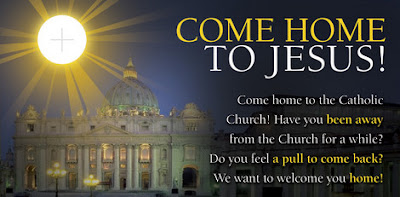After my last post it was drawn to my attention that a new phrase to describe the lapsed has entered the politically correct lexicon of our PC aware Church. The materials for Home Mission Sunday now refer to "Non-Church going Catholics".
It seems that those who composed the materials are not completely sure that this phrase will be understood by the average person in the pew as it is sometimes used in conjunction (in brackets) with the explanation "lapsed". I'm uneasy with it as it seems another little nudge to making lapsation acceptable. (Ironic, considering the context.)
Let us call a spade a spade. A Catholic who is non-churchgoing is a sinner (I cast no stones in that direction, as I would not like the number that could be thrown back at me!) Calling the sinner to repent has the pre-requisite that the sin is named, recognised and owned before it can be repented, confessed and forgiven.
The phrase "non-Churchgoing Catholic" seems to make the lapsed just another variety of Catholic. There are liberal Catholics, Traditional Catholics, cradle Catholics, Charismatic Catholics and ... non-Churchgoing Catholics. To be non-Churchgoing is a fundamental denial of one's Faith. Whatever a person's relationship to the Church is, every catholic should be Church-going. They may not be able to or feel able to go to Communion but they should be at Church - that is to say at Mass. In fact, attending Mass while not receiving communion (for the variety of reasons there can be for that) seems to me to be a truly humble act. It speaks of someone recognising their sin and taking it seriously. The non-Churchgoing are often those who feel quite free to walk up to the communion rail and receive at first Communions, Confirmations, weddings and funerals even though it was the last such event that they crossed the threshold. Often this is not their fault. They learnt at school that though they never went to Mass from one month to the next with their families on a Sunday, they must all come up to receive Communion at the end of year school Mass (on the grounds that it's not their fault parents didn't take them to Mass and no-one must feel left out). But if they are not taught the lesson at school the ignorance persists and the lesson they learn from their practical experience is that it's fine to receive Holy Communion whenever you are at Mass, even if you haven't given the Faith a thought for months or years.
I'm not suggesting we shouldn't use gentle persuasion and pastoral care when calling home the lost. I am suggesting that we should be teaching that to be lost is a threat to the life of the immortal soul and a tragedy. An American friend of mine calls lapsed Catholics "failed Catholics" (he should know, he was "failed" for may years). That might appear a tad judgemental as description but perhaps brings my thoughts to the fact that we're all failed Catholics in one way or another.
I think in a general way we need some more emphasis on a brand of Catholic that is much more prevalent in the Church, a category that is the ultimately politically correct one, as it excludes no-one. What category is that?
Sinning Catholics!
Here are some other materials praying for the return of sinners.
Almighty Father,
. You desire not the death of the sinner, but that he may be converted and live.
Pour out upon us Your mercy and hear the prayers of Your servants.
Soften the hearts of Your children who have strayed from the true path which You established for their salvation.
They are now forgetful of their duties as Catholics,
. You desire not the death of the sinner, but that he may be converted and live.
Pour out upon us Your mercy and hear the prayers of Your servants.
Soften the hearts of Your children who have strayed from the true path which You established for their salvation.
They are now forgetful of their duties as Catholics,
and pursue the pleasures of the world.
Grant that they may quickly return to the practice of every Christian virtue,
so that their lives may shine with the integrity of faith,
Grant that they may quickly return to the practice of every Christian virtue,
so that their lives may shine with the integrity of faith,
the fervour of piety, and the ardour of charity.
Restore them all to Your sacraments and the life of Your grace,
through the merits of the most precious blood of Your Son, our Saviour Jesus Christ.
Amen
Restore them all to Your sacraments and the life of Your grace,
through the merits of the most precious blood of Your Son, our Saviour Jesus Christ.
Amen






.JPG)







.JPG)



















